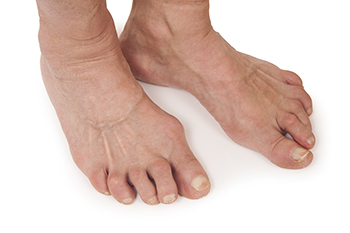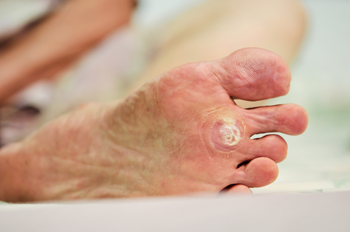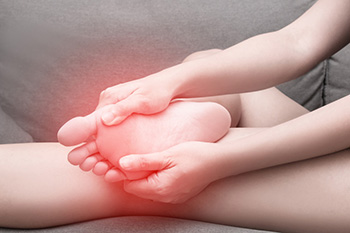Items filtered by date: November 2023
The Significance of Prioritizing Foot Hygiene

Amidst daily routines, it is easy to overlook the important role that foot hygiene plays in your overall well-being. Your feet bear the weight of the body, enduring countless steps each day, and proper hygiene is paramount for maintaining their health. Regular washing and thorough drying of the feet not only eliminate accumulated dirt and bacteria but also prevent fungal infections. Trimming toenails straight across reduces the risk of ingrown nails, fostering comfort and preventing potential complications. Moisturizing dry skin on the feet helps prevent painful cracks and discomfort. Choosing breathable footwear and rotating shoe pairs can minimize the risk of bacterial and fungal growth. Practicing foot hygiene is not just about aesthetics, it is a fundamental aspect of self-care. By dedicating a few moments to foot hygiene each day, you invest in the well-being of an often-neglected part of your body, promoting comfort, health, and overall vitality. If you would like more information about essential everyday foot care tips, it is suggested that you consult a podiatrist, who can provide you with the knowledge you are seeking.
Everyday foot care is very important to prevent infection and other foot ailments. If you need your feet checked, contact Jim Maxka, DPM from South Penn Foot & Ankle Associates. Our doctor can provide the care you need to keep you pain-free and on your feet.
Everyday Foot Care
Often, people take care of their bodies, face and hair more so than they do for their feet. But the feet are a very important aspect of our bodies, and one that we should pay more attention to. Without our feet, we would not be able to perform most daily tasks.
It is best to check your feet regularly to make sure there are no new bruises or cuts that you may not have noticed before. For dry feet, moisturizer can easily be a remedy and can be applied as often as necessary to the affected areas. Wearing shoes that fit well can also help you maintain good foot health, as well as making it easier to walk and do daily activities without the stress or pain of ill-fitting shoes, high heels, or even flip flops. Wearing clean socks with closed shoes is important to ensure that sweat and bacteria do not accumulate within the shoe. Clean socks help to prevent Athlete’s foot, fungi problems, bad odors, and can absorb sweat.
If you have any questions please feel free to contact our office located in Hanover, PA . We offer the newest diagnostic and treatment technologies for all your foot and ankle needs.
Telltale Signs of Rheumatoid Arthritis in the Feet

Rheumatoid arthritis, or RA, is an autoimmune disorder that primarily affects the joints, and the feet are often one of the first areas to display symptoms. Understanding the signs of RA in the feet is essential for early diagnosis and effective management of this chronic condition. One common symptom of RA in the feet is joint pain and stiffness. Affected individuals may experience discomfort in the joints of the toes, ankles, or the midfoot. This pain is typically more pronounced in the morning and may improve with movement. Swelling is another noticeable sign. RA can cause inflammation in the synovium, a lining that surrounds joints. When this occurs in the feet, it leads to visible swelling, making it harder to wear shoes comfortably. Deformities, such as bunions, claw toes, or hammertoes, can also develop due to the erosion of joint tissues. These ailments are often accompanied by limited mobility in the affected toes. If you notice these symptoms in your feet, it is suggested that you consult a podiatrist who can effectively diagnose RA, and help you to manage this condition.
Because RA affects more than just your joints, including the joints in your feet and ankles, it is important to seek early diagnosis from your podiatrist if you feel like the pain in your feet might be caused by RA. For more information, contact Jim Maxka, DPM of South Penn Foot & Ankle Associates. Our doctor will assist you with all of your podiatric concerns.
What Is Rheumatoid Arthritis?
Rheumatoid Arthritis (RA) is an autoimmune disorder in which the body’s own immune system attacks the membranes surrounding the joints. Inflammation of the lining and eventually the destruction of the joint’s cartilage and bone occur, causing severe pain and immobility.
Rheumatoid Arthritis of the Feet
Although RA usually attacks multiple bones and joints throughout the entire body, almost 90 percent of cases result in pain in the foot or ankle area.
Symptoms
- Swelling and pain in the feet
- Stiffness in the feet
- Pain on the ball or sole of feet
- Joint shift and deformation
Diagnosis
Quick diagnosis of RA in the feet is important so that the podiatrist can treat the area effectively. Your doctor will ask you about your medical history, occupation, and lifestyle to determine the origin of the condition. Rheumatoid Factor tests help to determine if someone is affected by the disease.
If you have any questions please feel free to contact our office located in Hanover, PA . We offer the newest diagnostic and treatment technologies for all your foot and ankle needs.
HPV Strains and Plantar Warts

Human Papilloma Virus, or HPV, is a large family of viruses, with over 150 types, and it is common for individuals to contract at least one type during their lifetime. Symptoms vary depending on the HPV strain, and while approximately 75 percent of HPV types cause common warts, others lead to more serious conditions. Often, HPV shows no symptoms, making some of its effects silent. For instance, plantar warts are a lesser known manifestation of HPV. They develop under the pressure points of the feet, such as the heels or the balls of the feet, and can be identified by their hard, grainy texture. Although they can be painful due to their location, some individuals may not notice them if they are not causing discomfort. It is advisable to examine your feet regularly, checking for any new growths or changes, including warts, as they could indicate an HPV infection. If you find you have a wart on your foot, it is suggested that you make an appointment with a podiatrist to have it examined and treated as necessary.
Plantar warts can be very uncomfortable. If you need your feet checked, contact Jim Maxka, DPM from South Penn Foot & Ankle Associates. Our doctor will assist you with all of your foot and ankle needs.
About Plantar Warts
Plantar warts are the result of HPV, or human papillomavirus, getting into open wounds on the feet. They are mostly found on the heels or balls of the feet.
While plantar warts are generally harmless, those experiencing excessive pain or those suffering from diabetes or a compromised immune system require immediate medical care. Plantar warts are easily diagnosed, usually through scraping off a bit of rough skin or by getting a biopsy.
Symptoms
- Lesions on the bottom of your feet, usually rough and grainy
- Hard or thick callused spots
- Wart seeds, which are small clotted blood vessels that look like little black spots
- Pain, discomfort, or tenderness of your feet when walking or standing
Treatment
- Freezing
- Electric tool removal
- Laser Treatment
- Topical Creams (prescription only)
- Over-the-counter medications
To help prevent developing plantar warts, avoid walking barefoot over abrasive surfaces that can cause cuts or wounds for HPV to get into. Avoiding direct contact with other warts, as well as not picking or rubbing existing warts, can help prevent the further spread of plantar warts. However, if you think you have developed plantar warts, speak to your podiatrist. He or she can diagnose the warts on your feet and recommend the appropriate treatment options.
If you have any questions please feel free to contact our office located in Hanover, PA . We offer the newest diagnostic and treatment technologies for all your foot and ankle needs.
Plantar Warts Can Be Treated!
Symptoms and Treatment of Freiberg's Disease

Freiberg's disease, a condition affecting the bones in the ball of the foot, often near the base of the big toe, can cause substantial pain and discomfort. It is more apt to affect runners, dancers, and women who wear high heels. Freiberg's disease sometimes affects people with a short big toe and a longer second toe. It is characterized by the death of tissue in the foot's bones, primarily the second metatarsal head. Symptoms can include persistent pain, described as a sharp, aching discomfort. Swelling and stiffness in the affected joint can hinder mobility. The pain worsens during weight-bearing activities, especially when pushing off of the foot and wearing high-heeled shoes. Freiberg's disease is more prevalent in adolescent girls experiencing rapid growth, or people with specific bone structure issues. Diagnosis by a podiatrist involves taking X-rays to confirm and assess the condition's severity. Treatment options include corticosteroid injections to help manage pain and inflammation during flare-ups. Footwear modifications, including low-heeled shoes with thicker soles and rounded heels, can help redistribute pressure across the foot. Custom orthotics also can relieve pressure on affected joints. Surgery, which is rarely required, may involve removing the second metatarsal bone for unmanageable, persistent pain. If you suspect you may be suffering from Freiberg's disease, it is suggested that you make an appointment with a podiatrist for an accurate diagnosis and personalized treatment plan.
Some foot conditions may require additional professional care. If you have any concerns, contact Jim Maxka, DPM of South Penn Foot & Ankle Associates. Our doctor can provide the care you need to keep you pain-free and on your feet.
Rare Foot Conditions
The majority of foot conditions are common and can be treated by a podiatrist. Standard diagnostic procedures are generally used to identify specific conditions and treatment can be rendered. A podiatrist also treats rare foot conditions which can be difficult to diagnose and may need extra attention and care.
There are many rare foot conditions that can affect children. Some of these can include:
- Freiberg’s disease
- Kohler’s disease
- Maffucci syndrome
Freiberg’s disease - This can be seen as a deterioration and flattening of a metatarsal bone that exists in the ball of the foot. It typically affects pre-teen and teenage girls, but can affect anyone at any age. Symptoms that can accompany this can be swelling, stiffness, and the patient may limp.
Kohler’s disease - This often targets the bone in the arch of the foot and affects younger boys. It can lead to an interruption of the blood supply which ultimately can lead to bone deterioration. The patient may limp or experience tenderness, swelling, and redness.
Maffucci syndrome - This affects the long bones in a child’s foot leading to the development of abnormal bone lesions. They are benign growths and typically develop in early childhood and the bones may be susceptible to breaking.
A podiatrist can properly diagnose and treat all types of rare foot conditions. If your child is affected by any of these symptoms or conditions, please don’t hesitate to call our office so the correct treatment method can begin.
If you have any questions please feel free to contact our office located in Hanover, PA . We offer the newest diagnostic tools and technology to treat your foot and ankle needs.

